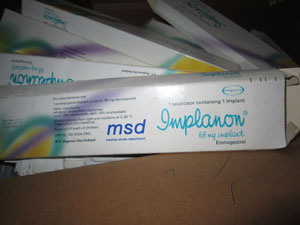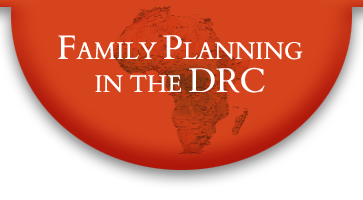Commodities
The WHO framework on health systems strengthening labels this item as “medical products, vaccines, and technologies,” but in FP parlance, the commonly used term is commodities, used to describe the contraceptives of the family planning program. One common slogan that emphasizes the importance of commodities is: “No product, no program.”
Maintaining an adequate flow of contraceptives has been a major challenge to the FP program in the DRC. Local experts cite it as one of the major barriers to the more widespread use of contraceptives. “Contraceptive security” refers to maintaining a satisfactory level and flow of contraceptives in the country and into to the facilities that need the products. Steps in this process include selection, forecasting, procuring, receiving, warehousing, distributing, and accounting for the entire process.
To increase the sustainability of the system, the DRC has adopted a policy whereby organizations may charge a small fee to clients for the methods. However, many give the contraceptives for free if the client does not have the ability to pay. The PNSR has the price list for contraceptives on the right, intended to be the norm for programs receiving contraceptive commodities from USAID and UNFPA.

| Contraceptive Method | Types | Units | Congolese Franc | US Dollar |
|---|---|---|---|---|
| Oral Contraceptive Pill |
Microgynon
Lo-femenal Ovrette |
1 cycle | 200 CDF | $0,22 |
| Oral Contraceptive Pill |
Microgynon
Lo-femenal Ovrette | 3 cycles | 500 CDF | $0,55 |
| Injectables |
Depo-Provera
Noristerat |
1 dose | 1 500 CDF | $1,55 |
| Implants |
Norplant-2
Jadelle |
1 pièce | 18 620 CDF | $20,00 |
| IUD |
Copper T 380A
TCu 380 |
1 pièce | 1 500 CDF | $1,55 |
| Cyclebeads | 1 collier | 500 CDF | $0,55 | |
| Condom | Female | 1 pièce | 50 CDF | $0,06 |
| Condom | Male | 1 pièce | 150 CDF | $0,17 |
TECHNICAL GROUP FOR CONTRACEPTIVE SECURITY
 The flow of contraceptives into the country was greatly limited during the period of civil unrest (early 1990s to early 2000s). PSI did continue to import and distribute condoms and some other commodities during that period. However, in 2004, the first Strategic Plan of Reproductive Health Product Security (Plan Strategique de Securisation des Produits de la Santé de la Reproduction, 2003-2005) was written based on the results of a survey conducted by PNSR with financial support from UNFPA; it exposed the issues at each stage of the procurement cycle across seven provinces in the DRC. It laid the foundations for reinstating a system of procurement and distribution of contraceptives in the country. This plan aspired to increase the accessibility of quality reproductive health services and make available the full range of reproductive health products in health care facilities through capacity building of staff, mobilization of financial resources including governmental support, and improving the supply circuit and storage of products.
The flow of contraceptives into the country was greatly limited during the period of civil unrest (early 1990s to early 2000s). PSI did continue to import and distribute condoms and some other commodities during that period. However, in 2004, the first Strategic Plan of Reproductive Health Product Security (Plan Strategique de Securisation des Produits de la Santé de la Reproduction, 2003-2005) was written based on the results of a survey conducted by PNSR with financial support from UNFPA; it exposed the issues at each stage of the procurement cycle across seven provinces in the DRC. It laid the foundations for reinstating a system of procurement and distribution of contraceptives in the country. This plan aspired to increase the accessibility of quality reproductive health services and make available the full range of reproductive health products in health care facilities through capacity building of staff, mobilization of financial resources including governmental support, and improving the supply circuit and storage of products.
After the Ministry of Public Health conducted an evaluation in March 2007, the PNSR created the current contraceptive security plan for a five-year period (2008-2012), with funding from the UNFPA and technical support from the DELIVER Project of USAID. It established strategic priorities in regards to context, coordination, commitment, capital, products, capacity, demand, and use. The evaluation found that a severe hindrance to contraceptive security in the country was the lack of a formal framework for coordination and consultation between partners. Therefore, the working group reorganized their working agenda, focusing on stakeholder and intervention mapping to determine the flow of contraceptive commodities and collaborative planning between partners to address needs. The plan has improved the availability of products in some provinces, capacity building of staff in logistics management, and creating an operational working group on the safety of facilities. However, inefficiencies remain in coverage of the country's needs, the ability to generate and use information on centralized procurement, mobilization of resources for more products, response coordination, and a long-term commitment from both government and partners.
Groupe Technique SPSR
The DRC has a Commodity Security Groupe Technique SPSR, which consists of representatives from the PNSR, the Programme National d’Approvisionnement des Médicaments (PNAM), the Direction de la Pharmacie et Médicaments, the Direction des Etablissements Hospitaliers, the Programme National de Lutte contre le Paludisme (PNLP), UNFPA, and USAID, among others.
The primary objective of this Groupe Technique SPSR is to coordinate activities of all Ministry of Health partners working in health to ensure reproductive contraceptive security (defined broadly as reproductive health products). Strategic Plan of Reproductive Health Product Security of the DRC (2008-2012) has served as a reference document for the work of the Commodity Security Groupe Technique SPSR, although it will soon need to be updated.
The intention of the committee is to ensure that the unmet need for reproductive health products is identified and fulfilled throughout the DRC, through monitoring and evaluation as well as the coordination of partners involved in securing reproductive health products. This committee was intended to meet quarterly, and with the arrival of the C-Change project in 2010 to coordinate meeting logistics, it has met more regularly since then than previously.
Currently, two organizations play a leadership role in contraceptive security for the DRC, in support of the PNSR: UNFPA and the Management Sciences for Health (MSH) USAID-funded Systems for Improving Access to Pharmaceuticals and Services (SIAPS). Although the two organizations frequently exchange information, they manage the two systems entirely independently.
PNSR has the mandate to coordinate all reproductive health activities at all levels, including supervision and tracking of commodities that are shipped to the provinces. However, they have not been successful so far due to the lack of resources earmarked for this task.
